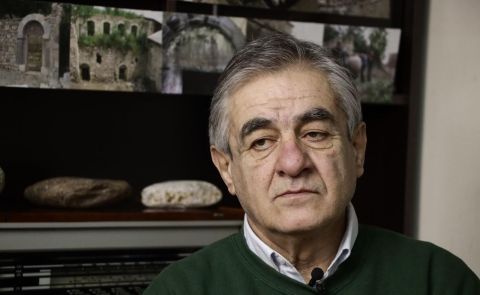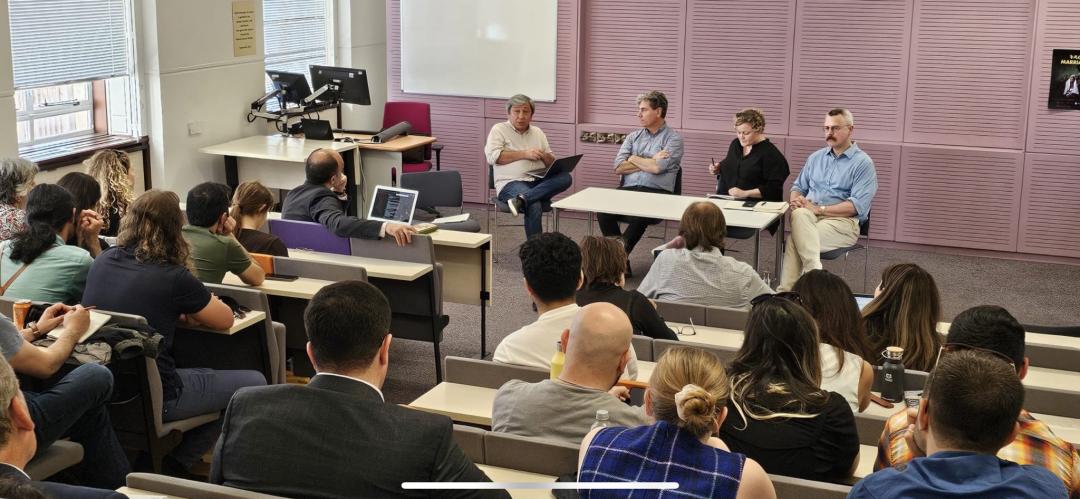
Vicken Cheterian: “History Is Politically Subversive”

The meeting of historians is rarely news. The Araz group (Armenia-Azerbaijan) is somewhat exceptional in this sense. They are a group whose primary contribution is allegiance to history as a science and methodology, rather than a patriotic narrative. Among them is Vicken Cheterian, a senior lecturer in international relations at the University of Geneva, specialising in the Middle East and North Africa. On Friday, June 21, Caucasus Watch convened with him at a public event to update the broader audience on the project's advancement. The idea is to create a laboratory, a safe space, where historians advance knowledge of the conflict’s history rather than narratives with instrumental political significance.
Politics and history go hand in hand. Typically, there is a legitimate attempt to frame contemporary challenges in their historical context. But politics usually involves a different kind of history that quickly degenerates into a discussion about the inevitability of conflict between two peoples, Armenians and Azerbaijanis. The end result is to frame the conflict as inescapable. This was the point of consensus between Prime Minister Nikol Pashinyan and President Ilham Aliyev at the Munich Security Conference in February 2020, weeks before the war that changed the region. The two statements publicly engaged in a debate about historical rights over the territory, stretching back centuries and seeking to affirm historical rights.
However, beyond the inevitability of conflict, there is history that resorts to a rigorous methodology, seeking casualties and events in archives and oral testimony, and critically questioning the political certainties of the present. In that sense, history is subversive, or defiant of political certainties. This subversive intention underpins the historical laboratory run by Vicken Cheterian, Altay Goyushov, Aude Merlin, and Laurence Broers.
Can we start by outlining the intentions of this "historical laboratory," which you refer to as a "safe space" for historians?
It started with a conversation between me and Altay Goyushov after the 2020 war. Altay is the founder and director of Baku Research Institute Altai. He asked me, "Would you write for us?" That's how our collaboration started. During a conversation, I told Altay that for years, I had seen a need for a scholarly initiative where we could come together from different perspectives. And by different perspectives, I don't mean ethnic perspectives. I mean scholars who work at different universities, who have different linguistic training, access to different archives, and newspaper collections.
The “war” of 2020 showed us that there's a lot about this conflict that we don't know. For 30 years, we have been repeating one narrative “of inevitable ethnic conflict” that we need to contest. Without an alternative hypothesis, we will revisit the same sources, reproduce the same certainties, and relive the same consequences. So, my first instinct after the Karabakh war was that scholars needed to understand what was happening. We need broader collaboration.
To be clear, historians played a negative role in the genesis of this conflict. Throughout the late Soviet period, historians provided ideological narratives justifying the conflict, supporting nationalist discourse. Presidents have taken over the historical narrative. In the case of Azerbaijan, Ilham Aliyev decides what Azerbaijani historiography should look like, and should one deviate from this framework, they are punished: they lose their job, they are exiled, imprisoned, etc. There's a parallel with Putin prior to the invasion of Ukraine, when, a year earlier, he wrote an article questioning the country's claim to legitimate historical statehood. The day before the invasion, he gave a 50-minute televised address repeating this historical thesis. History is significant in conflict; we are very conscious of that reality.
What we want to do is, first of all, science. Working as historians and social scientists, we are deconstructing the dominant, hegemonic, nationalistic, and militaristic discourses that today justify aggression, violence, wars, and crimes against humanity.
On the practical side, Aude Merlin of the University of Brussels joined this core team, and we were eventually joined by Laurence Broers of Conciliation Resources in London. Laurence is not just a foreign policy practitioner but also one of the editors of the Caucasus Survey. The four of us organized a first three-day workshop in Brussels, where academics with a background in Yerevan and Baku state universities and those from European academic institutions could come together and engage as scholars. We had a second workshop at Manchester University, followed by an event at SOAS (the School of Oriental and African Studies) in London, reaching out to the interested public, including journalists, academics, diplomats, and others.
Given that you believe history is a commentary on the present, what do you hope the project will accomplish? If historians are responsible for fueling the conflict, what other actions can they take? Can they do the reverse?
I do think so. The historiographies of Armenia and Azerbaijan are rooted in Soviet tradition. The Soviets established those history departments in Yerevan and Baku to serve a very ideological purpose. Their mission was to develop a historiographic narrative to justify the political choices made by the Soviets. The principal choice was to create territorial nation-states within the Soviet Union. So, Soviet Armenian historiography was there to justify Soviet Armenia, like Azerbaijani historiography. These historical narratives were developed in isolation.
The truth is that if you want to write the history of the Armenians, you have to bring together two historiographical traditions: one East European (Russian or Soviet) and one Middle Eastern. The same goes with Azerbaijan. If you want just Little Azerbaijan and Little Armenia, you won't understand this history. You have to put them in context. Instead, they created isolated Armenian and Azerbaijani historiographies, nationalistic discourses stemming from Soviet tradition with severe censorship.
Apart from commenting on the present, I would like to go back to the past. For me, there are many unknowns about what happened in 1988, 1987, and 1986, which led to the conflict. By asking questions, I want to move away from nationalistic discourse, which frames Armenians and Azerbaijanis as essentially nationalistic people who cannot help being entangled in conflict. We don't have political, sociological, or economic perspectives on what happened. Of course, nationalism was there. I'm not denying that. But there was also politics. Each national camp had different trends, factions, infighting, and internal killings.
Reducing the whole history to the single term "nationalism" fails to explain much. For instance, the Karabakh conflict is part of the collapse of the Soviet Union and the transition of economies from the Soviet model to capitalism. The question is how you tell the story of this transition in Armenia and Azerbaijan. There is very little research on this factor. There are whole schools of research that you can draw from to get a richer academic perspective. This will have repercussions for current debates. For example, in Azerbaijan, many people thought the Azerbaijani victory in Nagorno-Karabakh would end domestic political tension. The opposite is true. There's more repression in Azerbaijan today than in 2019, and to understand this, you have to appraise the political debate since independence.
I imagine Armenia, following the latest events in September 2023, is grappling with its own understanding of the Karabakh issue and its political implications. But isn't it all that too fresh to become the subject of a historical analysis?
The events of 2020, 2022, and 2023 are, indeed, very fresh. With immediate events, you can do different things. You can do oral history to record certain things that you might revisit in five, ten, or twenty years and see them differently. But if you don't do that research today, you will not have the primary sources to work on later. To understand the events of 2020, you must articulate new research questions and frame them in the context of events unfolding from 1988 or 1991 to 1994. So, I think we have a lot to do.
I teach a course on conflicts in the Caucasus. I know the literature, and I know the limitations of it. With this initiative, my primary goal is to advance in science and push the boundaries of our knowledge. But at the same time, I'm very conscious that what we are doing has an immediate political and intellectual impact on these two societies.
Interview conducted by Ilya Roubanis
See Also


Irina Mamulashvili: Electoral Interference is a Playbook, not a Recipe

Giorgi Gakharia: The EU Should Engage Georgia Despite Its Democratic Backsliding

Peace or Capitulation? Shahverdyan on Armenia-Azerbaijan Agreement and the Nagorno-Karabakh Crisis

Ali Mousavi Khalkhali: Iran Will Avoid Conflict in the Caucasus

